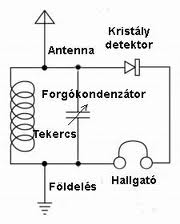Actions
detektoros jpg
(6.47 KB, 180x224)
(6.47 KB, 180x224)
LGT: A rádió/Szól a rádió (~The Radio/The Radio is On) - lyrics It was called "broadcasting" and it cost a lot When the first speaker sat at the microphone His metallic voice lifted off and flew far And a listener thought - The test was successful Note: it was really called "broadcasting" in the beginning, with the English term. Prior to that we had something on the Hungary that can be translated to "telenews" which was an idea of the Hungarian inventor, Puskás Tivadar of the telephone exchange. He imagined that the telephone wasn't just for communication between two parties but a tool for mass communication, and they organized a news service that could be listened via the telephone. It had liek 10K subscriber in the country. Anyway he worked closely with Edison, and I think English/American practices had great impact on telecommunication hereabout. On the Gyáli street a closed up furniture truck stood Which served as the first radio studio in '23 And it was served as broadcast fine When adjutant John Marcal sang a song Note: this is all true. The first experimental radio station was set up in a furniture transporting truck (it was roomy enough) and it stood on the yard of a post office on the Gyáli street, Budapest. Marcal János was a postal coworker, who was an amateur singer. They thought just reading stuff would be too dry and wanted a colorful insert, so they asked him to sing. They could note about the radio in '24 That it broadcasted the first concert from the Zoo And the producers cursed the competition Which sold the Rhapsody in Blue without profit Note: The first two lines are about the Zoo of Budapest, which was an important place for community events, and they held concerts there regularly (the Zoo had it's on orchestra as well). This broadcast in 1924 June, was still experimental as far as I know, since "official" radio was started next year. The lines about the copyright wankery surely is a note about the issue how the IP holders needs to be compensated after their stuff is broadcasted. Rhapsody in Blue was published in 1924. The amateurs living nearby heard clearly When the station of Csepel greeted with a Good Morning in '25 All kinds of weird antennas jumped into the air And a clever student tinkered a detector receiver Note: as I wrote about the first official station was opened in 1925, at Csepel, a district of Budapest. The rest is about the spread of the radio, and ofc a nod towards the amateurs, enthusiasts who built their own equipment and had important role in the popularization of radio broadcasts.
